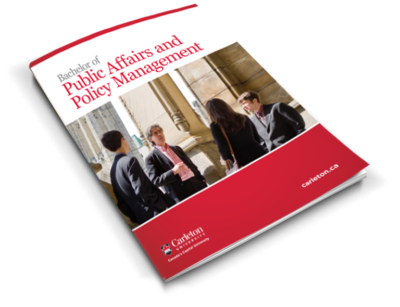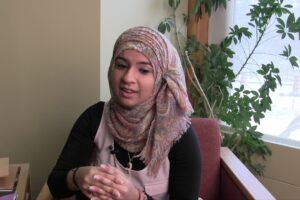Bachelor of Public Affairs and Policy Management
“When I first heard about the BPAPM program I did not know what to expect. However, the structure of the program as well as the different specializations it offered gave me an opportunity to really understand which field I wanted to pursue.”
— Mozynah Nofal


From climate change, to war and conflict, to housing and homelessness, the world is facing numerous public policy challenges. Public policy – the decisions that governments make, or fail to make – affects the severity of these issues and our ability to navigate them.
PAPM educates public policy makers. Our graduates are working to address these challenges as policy analysts (who analyze issues and advise governments); elected officials; leaders of advocacy groups; researchers and university professors.
Our students learn about public policy from a number of perspectives – from public policy studies, to economics, to history, to Indigenous studies and political science. They have a depth and breadth of knowledge which enables them to contribute to policy making at all levels of government in Canada and in private, non-profit, and public organizations here and overseas.
The Faculty of Public and Global Affairs is unique in Canada, attracting future leaders who go on to work in government, media, nonprofit organizations and much more. Our students learn from experts in their field and have the chance to pursue job placements within national and international organizations, as well as study abroad. Learn more about the undergraduate degrees we offer in FPGA.
Learn more about BPAPM

Alumni

Learn More About the BPAPM Specializations

Academic Advising Hours

Hands-On Learning Opportunities
Videos
2020 Graduation Valedictory Address by Sancho Angulo
BPAPM – The Student Perspective
Carleton Stories: Kajal
Carleton University: The Capital Advantage
Events
No event posts are available.
News
-
2 min read
BPAPM Student Becomes one of the AMO Youth Fellows 2026
A healthy democracy relies on the active participation of young people. The decisions made today will shape the communities of tomorrow, making youth perspectives essential…
-
1 min read
PAPM Student awarded the Jiu Ding Scholarship
Jacky Chan has been awarded the Jiu Ding Scholarship in recognition of his academic excellence, community engagement, and leadership potential. As a driven Chinese-Canadian student, Jacky…
-
2 min read
2025 Arthur Kroeger College Awards Recipients
Please welcome the winners of 2025 Arthur Kroeger College Awards! Prince Memorial Achievement Award (Book Award) Allie Pepin (BPAPM) Lindsey Keene (BPAPM) Hannah Williams (BGINS)…
-
3 min read
PAPM Recent Graduate Published a Peer-Reviewed Article
Talya Stein, a recent BPAPM graduate and current master’s student at the London School of Economics, has published a peer-reviewed article with NPSIA’s Dr. Alex…
-
1 min read
PAPM student recognized as a King Charles III Coronation Medal Recipient
PAPM student Daniela Valenzuela Neto was recognized as a King Charles III Coronation Medal Recipient! Congratulations on receiving this well-earned award, Daniela! Your dedication…
-
1 min read
PAPM Student Selected for SSHRC Undergraduate Student Research Award
Hezel Ulona, 2024-2025 PAPMSS VP Community Outreach has been selected for the SSHRC Undergraduate Student Research Award (USRA). This summer, she will be…





